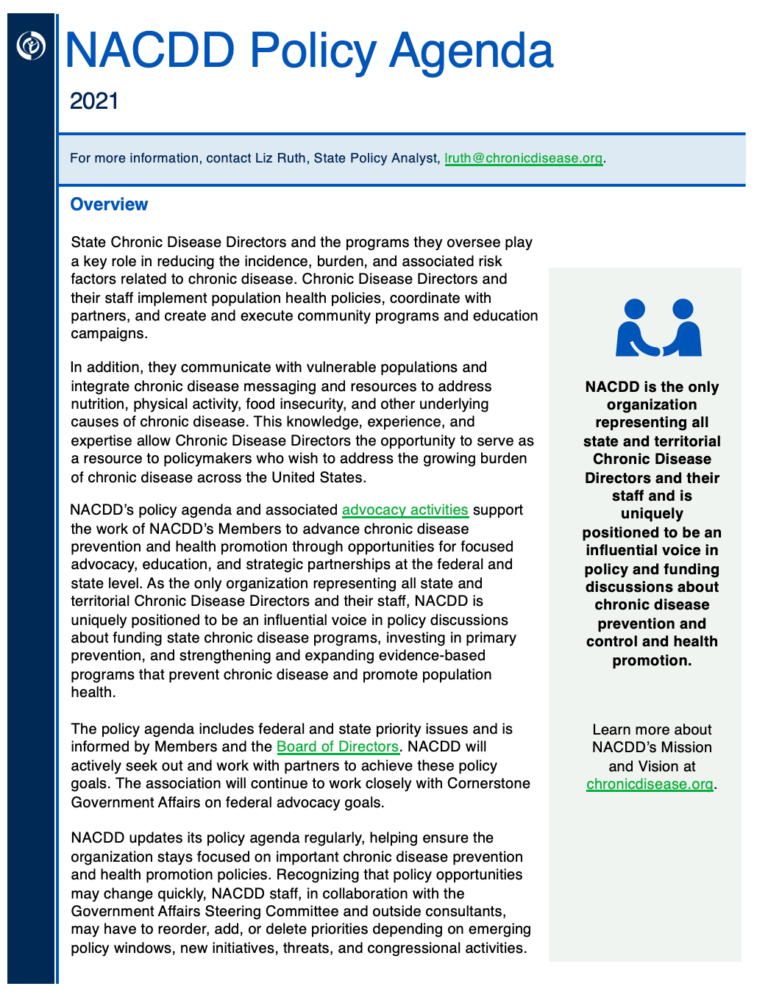NACDD Policy Agenda 2021
Overview
State Chronic Disease Directors and the programs they oversee play a key role in reducing the incidence, burden, and associated risk factors related to chronic disease. Chronic Disease Directors and their staff implement population health policies, coordinate with partners, and create and execute community programs and education campaigns.
In addition, they communicate with vulnerable populations and integrate chronic disease messaging and resources to address nutrition, physical activity, food insecurity, and other underlying causes of chronic disease. This knowledge, experience, and expertise allow Chronic Disease Directors the opportunity to serve as a resource to policymakers who wish to address the growing burden of chronic disease across the United States.
NACDD’s policy agenda and associated advocacy activities support the work of NACDD’s Members to advance chronic disease prevention and health promotion through opportunities for focused advocacy, education, and strategic partnerships at the federal and state level. As the only organization representing all state and territorial Chronic Disease Directors and their staff, NACDD is uniquely positioned to be an influential voice in policy discussions about funding state chronic disease programs, investing in primary prevention, and strengthening and expanding evidence-based programs that prevent chronic disease and promote population health.
The policy agenda includes federal and state priority issues and is informed by Members and the Board of Directors. NACDD will actively seek out and work with partners to achieve these policy goals. The association will continue to work closely with Cornerstone Government Affairs on federal advocacy goals.
NACDD updates its policy agenda regularly, helping ensure the organization stays focused on important chronic disease prevention and health promotion policies. Recognizing that policy opportunities may change quickly, NACDD staff, in collaboration with the Government Affairs Steering Committee and outside consultants, may have to reorder, add, or delete priorities depending on emerging policy windows, new initiatives, threats, and congressional activities.
Objectives and Key Activities
- Urge Congress to increase federal funding for CDC’s National Center for Chronic Disease Prevention and Health Promotion (NCCDPHP).
- Support continued funding for chronic disease prevention and control programs in every state and territory to allow the essential growth and development of state-based programs that address chronic diseases, risk factors, and social determinants of health.
- Explore and support additional chronic disease funding sources, including HHS, HRSA, ACL, NIH, and NCI.
- Develop materials to educate members of Congress and other policy stakeholders about the importance of continued funding for state programs. This will include fact sheets, issue briefs, policy statements, white papers, success stories, charts, and other visuals.
- Identify existing and new congressional champions who support funding chronic disease prevention and health promotion.
- Conduct educational sessions for Congress.
- Work with partners to seek funding to support this goal.
- Hold annual Hill Day and Policy Summit to engage Members on priority appropriations issues.
Objectives and Key Activities
- Support policies that advance and invest in primary prevention for chronic diseases.
- Educate members of Congress and other policy stakeholders on the difference between primary, secondary, and tertiary prevention.
- Document the return on investment of chronic disease prevention
and the effect of unfunded/underfunded programs. - Integrate information about primary prevention into white papers, issue briefs, fact sheets, and other virtual and in-person educational events.
- Work with strategic partners to promote the value of primary prevention.
Objectives and Key Activities
- Educate policymakers about the connection between social determinants of health and inequities in chronic disease outcomes.
- Track social determinants of health policies, including housing, justice, transportation and other sectors that affect health outcomes.
- Support federal, state, and local polices to address health equity and the social determinants of health.
- Educate policymakers about the effects of systemic racism on health and chronic disease outcomes.
- Support federal, state, and local policies that address racism as a public health crisis while continuing internal efforts around being an anti-racist organization.
- Educate policymakers and other stakeholders on the difference between health-related social needs, social determinants of health, and root causes of health.
Objectives and Key Activities
- Identify priority policy areas outside of the appropriations process.
- Solicit Member feedback on priority policy issues and how the
policies affect their work. - Identify non-traditional policy areas that affect chronic disease
(e.g. mental health, adverse childhood experiences (ACES), and caregiving). - Track legislation, hearings, and congressional statements about priority chronic disease policies.
- Monitor authorizing committee actions and proposals on key
policies that affect chronic disease prevention and health promotion. - Provide thought leadership and recommendations on emerging issues, including health debt, long COVID, and public health workforce.
- Identify congressional champions who support priority policy issues.
Objectives and Key Activities
- Support evidence-based state policies that advance chronic disease prevention and health promotion.
- Conduct Member surveys to identify policy needs as well as ways NACDD can support state policy activities executed by Members and their partners.
- Maintain state legislative tracker on NACDD’s website to promote education and awareness of key state policies.
- Provide education and training to Members on key policy topics.

